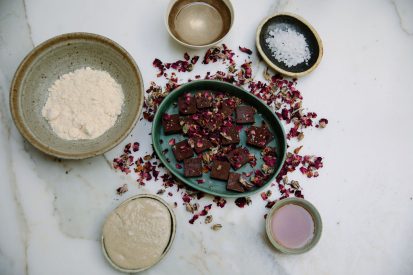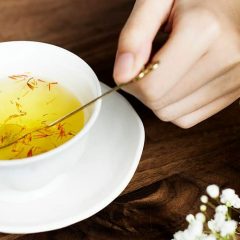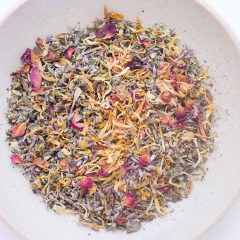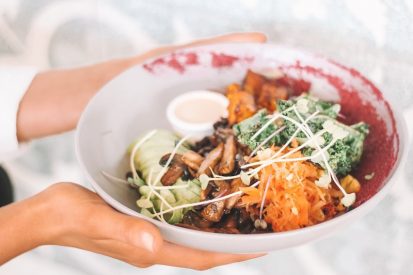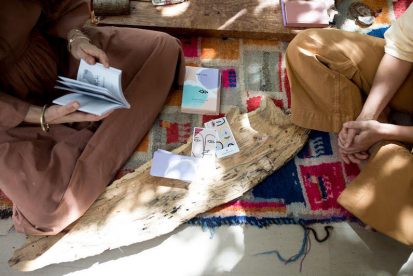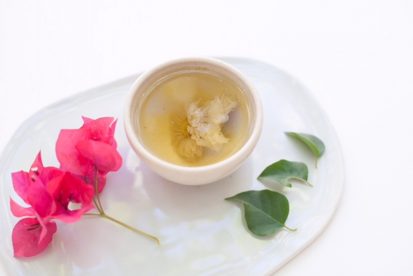Robyn O’Brien = Gentle Warrior
Recently I went to a luncheon hosted by Healthy Child Health World where I had the great pleasure of hearing Robin O’Brien speak. The focus of the event was on bringing awareness to Prop 37 which would make it mandatory for companies to label their foods. That way the public can be aware of what food products contain cancer causing GMO agents. I was immediately struck and moved by O’Brien gentle and compassionate way of speaking. O’Brien is a busy mother of four, author, former food industry analyst, and Fullbright Grant recipient. Discovery Channel calls her one of its 15 visionaries and she has been recognized many times over for her work with her organization AllergyKids. Her book The Unhealthy Truth illuminates how toxic our food supply has become. I feel so honored to have her interview here:
1) In a nut shell how did you become a crusader for organic foods?
I am such an unlikely crusader. Had someone ever suggested that I’d be described that way, I would have thought they were nuts! Growing up eating my fair share of Twinkies and Ding Dongs as a kid and then diet sodas and fat-free who know what in college, I never thought twice about food. I figured if it was on grocery store shelves, it was safe. I didn’t want anyone telling me what to eat. I worked as a financial analyst that covered the food industry, and then when I had kids, it was enough to just get them fed. Like most busy moms, I didn’t want anyone telling me what to feed them. But when our fourth child had an allergic reaction to breakfast one morning, I was thrown onto this changing landscape of health. ANd I was stunned to learn just how many conditions are impacting our children today: According to the Centers for Disease Control, there has been a 265% increase in the rates of hospitalizations related to food allergic reactions. Cancer is now the leading cause of death by disease in children under the age of 15 and 1 in3 Caucasian kids and 1 in 2 minority children are expected to be insulin-dependent by the time they reach adulthood. As a mother of four, I could not unlearn that information. And while our kids are only 30% of the population, they are 100% of our future, and the health of our country is dependent on the health of our children.
2) What is the one thing we can do stop GMO’s from entering all our food supply?
Teach others about these new ingredients in our food, from friends and family to doctors and legislators. Most of us, myself included, were never informed that in the 1990s, chemical companies began manufacturing new products, genetically engineered seeds that could withstand routine spraying of their chemicals or seeds that could synthesize their own insecticidal toxins. This shift in agriculture was so huge that the United States Patent and Trademark Office patented this new technology, making it impossible for farmers to store and save seeds. They now had to license the use of the technology, much like we license the use of Microsoft products. It is a brilliant business model, as it helped the chemical companies sell more chemicals. But since no long-term human health studies had ever been conducted, no pre-market safety tests and no independent testing by the FDA had been conducted and there was no way of knowing what the long-term health impacts of eating foods hardwired to withstand increasing doses of chemicals might be, almost 50 countries around the world decided to label these new ingredients, known as “GMOs” or “genetically modified organisms” as they entered the food supply. We didn’t do that here. To learn more, visit www.justlabelit.org
3) Is it true that even organic foods will soon be tainted by GMO’s because of the wind blowing those seeds or pesticides across farmlands?
Safety measures are put in place to try to ensure that organic food does not contain GMOs. By law, organic food can not be produced using genetically engineered seeds or the chemicals used to treat them. But as anyone knows, you can not control how the wind blows, and there have been cases where these chemical companies have sued farmers when their products (these seeds) have been found in places that they were not originally licensed for use. Was the farmer to blame? Was Mother Nature? It is this concern that has prompted countries like France and New Zealand to not allow genetically engineered crops to be planted in their soil, in an effort to prevent this cross-contamination and address any environmental or health concerns that these products might present.
4) I loved how you said it is patriotic to want healthy food. Do you believe this desire to controlour food is an assault on the feminine?
I have honestly never thought about it this way. Having worked as a financial analyst, what I do see is that it is the duty of executives in the chemical industry to drive shareholder return. It’s what they are paid to do. Their jobs are to create new business models and revenue opportunities which is exactly what the patenting of our food supply has done. Not only does it help these companies to sell more chemicals, as the seeds work in conjunction with the products and manufactured chemicals that are applied to them, but it also creates revenue streams in the form of licensing revenue, trait fees and royalty fees that can be charged to the farmer. If seed sales were to suffer, these fees can be increased and these revenue streams offer a hedge against that loss. The issue is that while these companies are doing this work for their shareholders, there are over 300 million stakeholders in the food supply, many of whom are unaware that these changes took place, since no labels on these ingredients were ever introduced in the United States.
5) what book is on your nightstand?
I’ve always got a handful of them going at the same time, and The Alchemist by Paulo Coelho is always there, reminding me to not be afraid. Right now, Einstein by Walter Isaacson, which is fascinating as Einstein was awed by the beauty of harmonies and believed that love is a beautiful teacher. When you look at how sick we have become, and yet how powerful love can be in helping us to do what might have seemed impossible, I find inspiration in his work. Mark Hyman’s Blood Sugar Solution, as it is such a resource and really should be read my every member of Congress if we are going to get a handle on disease in this country and the toll that it is taking on our economy and future opportunities for growth and leadership in the world. And Daring Greatly by Brene Brown about how the courage to be vulnerable transforms the way we live, love, parent and lead.
6) It was shocking for me to hear that most countries around the world have labeling including Russia and China but we don’t. Why is that?
Most countries do not allow a product on the market until it has been proven safe. In the US, we take a different approach: we allow something on the market until it is proven dangerous. So the burden of work is not carried by the corporation, pre-market (and they can claim “No evidence of harm” since no long-term human studies have been done) but falls post-market in which it is up to other groups, individuals, organizations to prove evidence of harm. But without labels on these ingredients in the US, there is no way to prove liability, traceability or accountability, which is in part why the industry opposes any form of food labeling legislation (like the proposed legislation in California www.carrighttoknow.org). Labels would give consumers the right to choose, to make an informed choice when feeding their families and to opt out of these ingredients. Labels would also bring accountability, liability and traceability. And since most developed countries have a health care system that is funded by taxpayers, they can not afford to be as sick as we are. Our health care system is privatized, corporations benefit because sadly sickness sells. Consequently, there is less of an incentive here in the United States to exercise the level of precaution being exercised in other countries. There is less of an incentive to prevent when prescriptions have become so profitable, the US spends more on health care costs and disease management than any other country on the planet, representing a sizable portion of our GDP.
7) I heard you mention 41% of americans will get cancer. Why are we still asleep about this in our nation?
This is very difficult information to hear. Cancer will now affect 1 in 2 men and 1 in 3 women in the US in their lifetime. It is the leading cause of death for US Latinos. And cancer is the leading cause of death by disease in children under the age of 15. Recently, doctors have written in the New England Journal of Medicine that the escalating costs of cancer care, coupled with drug shortages, are creating a situation that could bankrupt our health care system if not addressed. No one wants to hear that. Obesity tends to be the focus in the media right now, and for good reason, as it leads to other diseases, including cancer (for which a third are attributable to diet and lifestyle), but it also enables the focus to be on personal responsibility. Choose not to eat another bag of chips, drink another soda, says the food industry. But what if the very chemicals in those cans are linked to cancer? With over 80,000 chemicals in use in our everyday products and in our food, only 200 have undergone safety testing. And while correlation is not causation, the scope of the issue is enormous which is why it is so important that we all do our part to exercise precaution and try to reduce our exposure to manufactured chemicals, especially those now used on and in our foods, when and where we can, as most recently urged by the Presidents Cancer Panel. None of us can do everything, but all of us can do something. So maybe that one thing is to “Eat fewer chemicals” Opt out when you can and where you can, remembering this is about progress not perfection, so don’t make “the perfect” the enemy of “the good”
8) What or where is your favorite meal?
My favorite meal is at home in the backyard with family and friends. With four kids, mealtimes are a juggling act! So we do family style, recognizing that diet is a lot like religion and it’s not “one size fits all”. So we offer real food, food that my grandmother, whose food rules were written during her time as a young mother during World War 2, would recognize. But we didn’t always eat this way, as one of the kids is fond of saying, which is why it is so important to do what you can, where you are with what you have. Because it is together, making these changes in ways that we can afford, financially, emotionally, physically, that we will create the changes that we want to see in the health of our families and our food system. The food companies are listening, they have children with allergies, autism and diabetes, too. Never underestimate the power of love because it is our collective ability, and our love for our families, that will create the changes we want to see in the health of our country.


